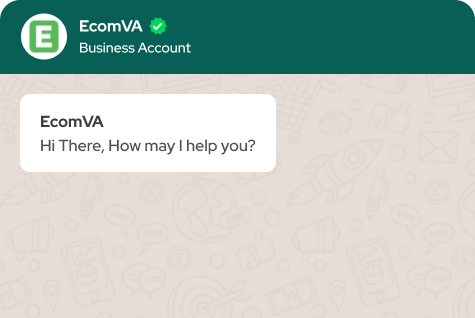How Email Support help for eCommerce Store Owners
Most of the customers or audience opt for a formal way of communicating with the e-commerce store. Here, email support lets customers share their concerts in detail while attaching multimedia like images, videos, or documents to make it easier for the store owner to understand the issue. So, it is important to provide instant reverts in email support and provide satisfactory solutions to your customers.
Email support is a valuable customer service channel for e-commerce store owners, offering several benefits that can contribute to a positive customer experience and improved business outcomes.
What is email support?
Email support is a popular customer care channel where companies respond to customers’ questions and complaints via email. Customers can use it to seek help asynchronously, sending messages whenever it is convenient for them, and getting thorough answers. Moreover, your business support agents need not be online at the same time. A win-win!
Benefits of email support in e-commerce stores
Asynchronous Communication
Email support excels in terms of adaptability. Customers can contact businesses whenever it’s convenient for them, unlike phone calls. This gives them the ability to draft considerate messages, properly list the issues they have, and resist the need for quick fixes.
Additionally, customers can go over the email thread at their speed to make sure they understand all the information the support staff has supplied. As it is asynchronous, it can accommodate users who would rather communicate thoughtfully, which lowers tension and creates a more relaxed atmosphere for problem-solving.
Detailed Explanations
Unlike phone calls, email discussions are not limited by time constraints. Consumers can provide images, error messages, or thorough product details in their explanations of their problems. Support representatives can understand the issue precisely thanks to this thorough description.
With a detailed picture in hand, agents can better tailor their replies to the individual problem, improving the precision and efficacy of the offered remedy.
Documentation
A documented record of every email exchange between the client and the support staff is helpful. This record benefits both parties in a meaningful way. Customers can examine previous correspondence or monitor the status of their issue resolution with the help of this clear reference point, enhancing e-commerce store management.
Support agents can teach recruits using documented email threads, and they can also make the transition between agents easier if an issue needs escalation.
Complex Inquiries
Email is the best option for complex or technical questions. Technical problems frequently call for thorough justifications, sequential instructions, or connections to relevant sources. Email is the ideal solution for these requirements. Clients can get thorough answers together with attachments such as troubleshooting manuals or instruction manuals.
The success rate of addressing complicated issues can thus be increased since they can study the instructions at their own pace and follow the directions.
Non-Intrusive
Store management virtual assistants acknowledge that users have hectic lifestyles. When a problem occurs, they can pinpoint it with an email rather than being constrained by office hours or lengthy phone line waits. This gives them the ability to quickly handle their issues and obtain the assistance they require without interfering with their job.
They can multitask and go about their day as they wait for a response from the support team because of the asynchronous nature of the process.
Language and Accessibility
Email is not limited by language. Clients with language hurdles or hearing impairments who prefer textual contact can simply create emails in their language of choice. By doing this, miscommunications that could occur during phone calls are eliminated.
After that, support teams can efficiently respond to these questions by using multilingual employees or translation systems, offering a comprehensive customer care experience.
Crisis Management
Email’s asynchronous functionality comes in handy in emergency scenarios as well. Email is an effective way to quickly provide important information to a large number of customers in the event of unexpected service interruptions or product problems.
After-Hours Support
Email serves as a link between business hours and client demands. Clients are welcome to send questions day or night. Your support staff can then respond to these emails during business hours, greatly increasing the amount of help that is available in addition to what can be provided over the phone.
Personalization
Email still allows for customization even if it does not have the back-and-forth of phone calls. Support representatives can customize their replies to meet the unique requirements and preferences of individual customers by utilizing client data and previous encounters.
This customization can include previous purchases, suggesting relevant troubleshooting procedures, or making specific product recommendations. These thoughtful touches show that you are concerned about every client and their particular circumstances.
Record Keeping
Email correspondence is a gold mine of customer interactions. Email thread analysis helps you spot recurring problems, understand client complaints, and get important insights into areas that need work.
This information can help you improve your customer service procedures, direct future marketing campaigns, and develop new products. You can provide outstanding customer service and consistently enhance your services by efficiently using email data.
Tips for effectively using email support in your e-commerce store
- Clear Communication: Provide a dedicated email address for customer support and make it visible on your website. Communicate response times to set customer expectations.
- Automated Responses: Use email automation services to let customers know that their inquiry has been received and that a response will follow.
- Template Responses: Develop a library of template responses for common inquiries to streamline the process and maintain consistency in your support communications.
- Response Time: Strive to respond to customer emails within a reasonable timeframe, typically within 24 hours.
- Professional Tone: Ensure that all email communications are professional, courteous, and helpful.
- Follow-up: After resolving an issue, consider sending a follow-up email to ensure customer satisfaction and gather feedback.
- Useful Links and Attachments: Include relevant links, attachments, and screenshots in your emails to guide customers through troubleshooting or provide additional information.
While email support offers flexibility and convenience, it’s important to balance it with other communication channels, like phone support and chat support, to offer a comprehensive customer service experience.
Also, the best part of email support is that it is easier to track the trail of messages. It helps the support team to understand the issues in detail and provide ideal solutions easily.





